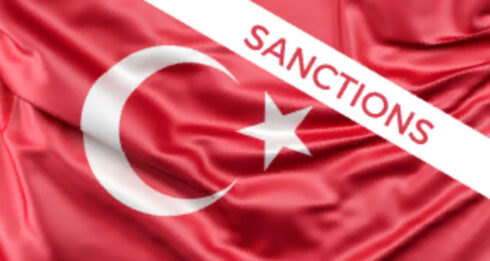Written by Uriel Araujo, researcher with a focus on international and ethnic conflicts
The US Treasury and State Departments last week announced one of the largest ever sanctions packages in history, which targets over 150 entities and individuals accused of “aiding” Moscow, including by shipping Western technology to Russia. The country’s largest carmaker has also been targeted, as well as companies in the United Arab Emirates, and Georgia. According to Treasury Secretary Janet Yellen, the goal is to hurt Russian military supply chains. James O’Brien, the head of the State Department’s Office of Sanctions Coordination said that the purpose of these measures is “to restrict Russia’s defense production capacity and to reduce the liquidity it has to pay for its war.”
The State Department has admitted it also sanctioned businesses involved in Russian mining and metals sectors besides energy production. The package also imposes game-changing sanctions on Turkey, an American NATO ally: five top Turkish companies have been hit over their alleged role in repairing sanctioned vessels connected to the Russian Defense Ministry and also in transferring “dual-use goods” (items that can be employed both for military and civilian purposes). Despite all previous Western sanctions, supply chains from Turkey, a Black Sea neighbor, so far have remained available for Russia, as well as other trading hubs.
For over a year an intense American pressure campaign has been going on to convince the Turkish government and private sector to cut ties with Russia. Several top US authorities, including Deputy Treasury Secretary Wally Adeyemo have traveled to the country as part of that effort. The surprising sanctions are a more extreme measure that is taking place at a complicated moment for Turkish-American relations: right now Washington is pressuring Turkish authorities in Ankara to ratify Sweden’s NATO membership in October (when Turkey’s parliament reconvenes).
In February I wrote on how Turkey had been blocking Swede’s bid to join the Atlantic alliance allegedly over the Nordic country’s policies pertaining to Kurdish exile groups, Sweden being home to a relatively large Kurdish diaspora – many Swedish politicians are known to have taken part in events organized by Kurdistan Workers’ Party (PKK) sympathizers, an organization deemed as a terrorist group by Ankara.
The Finnish and Swedish NATO bids are part of the militarization of Europe (its “NATOization”), as pursued by Joe Biden’s administration, which has also made clear it is pushing for an increasingly nuclearized Europe. The two countries’ membership will result in extending the Alliance’s territorial reach as far out as the Russian eastward Arctic flank, thus making Russia the only non-NATO state in the Arctic. This can only be described as the further “encircling” of Russia – NATO enlargement being one of the main reasons for today’s conflict.
Turkey has clearly been playing a very ambiguous role within the NATO structure, making good use of its veto power to obtain leverage. Its pressing goals about the Sweden issue have everything to do with American foreign policy in Syria, where it supports PKK-connected rebel Kurdish groups for a number of reasons. No matter how much Sweden acquiesces to Turkish demands, it seemed unlikely Ankara would change its stance on the country’s NATO membership unless Washington signaled it was ready to sacrifice its proxy efforts in the Levant in exchange for its NATO European goals. The US however does not seem to be ready and, as usual, wants it both ways.
By targeting critical Turkish companies instead of resorting to other kinds of diplomatic “quid pro quo” maneuvers, Washington damages its already deteriorating relationship with Ankara. The Turkish President (who was recently re-elected) has been carefully “balancing” between Russia and the US. Turkey did provide Ukraine with military equipment and weapons but at the same time has also maintained strong trade ties with the Russian Federation.
Amid pressures for “alignmentism” in the new cold war, Ankara has been struggling to maintain a “balancing” role and to keep stable bilateral relations with Moscow while playing a very delicate game. The fact that it employs Neo-Ottomanism, as well as Pan-Turkist and Turanist ideas as soft power tools for its greater ambitions in Central Asian and beyond can certainly further complicate its already complex relationship with Russia.
Since at least 2016, experts have been talking about a Turkish “eastern turn”. Erdogan’s Turkey is an emerging power that has its own geopolitical agenda, and its foreign diplomacy is extremely convoluted. By “playing tough” with Ankara in such a way, Washington paves the way for a number of unpredictable consequences which can even conclude backfiring.





the sanctions have become a massive power grab by a wannabe global government .. citizens of nato countries should know that immigrants make much better global citizens than themselves